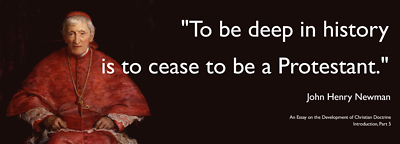A priest reader alerted me to an article in the Dartmouth alumni magazine about Fr. George Rutler, now pastor of St. Michael’s and the beleaguered Holy Innocents in Manhattan, then pastor, in 2012, of Our Savior.
In the article we find this paragraph with reference to some familiar Z-swag:
On the morning I meet with him in the rectory above Our Saviour, Rutler steps out of his kitchen in full clerical collar and cassock carrying two cups of coffee. One mug displays the slogan from the Polish solidarity movement, the other a line by Cardinal John Henry Newman, one of the more famous by the 19th-century reformer: “To be deep in history is to cease to be a Protestant.” Rutler jokes, “I like to serve my evangelical friends coffee in this.” The mugs seem to represent Rutler’s two sides, the sacred and the secular, each with a pointed world-view. After I suggest his coffee packs its own (bitter) punch, Rutler replies, “I’m sure those poor solidarity guys would be glad to have it.”
 Fr. Rutler has a new book out right now. I will be writing about it in due course. For now, however, here is the link:Principalities and Powers: Spiritual Combat 1942-1943
Fr. Rutler has a new book out right now. I will be writing about it in due course. For now, however, here is the link:Principalities and Powers: Spiritual Combat 1942-1943




































It is fascinating to follow up Joseph Wilhelm’s reference in his 1911 Catholic Encyclopedia article, “Protestantism”, to Philip Schaff’s “The Principle of Protestantism, German and English” (1845) – an English translation (with added appendix) of his 1844 German work, now available at the Internet Archive, which has not only an analytical table of contents but a handy summary in terms of 120 ‘theses’. The ‘Puseyism’ Schaff dismisses in 1844, would still have included Newman at that date: indeed, the excellent newmanreader.org lists “Development of Christian Doctrine” (first published late in 1845) from which the quotation comes under “Anglican Period” – concerning which we must see Newman’s postscript to the ‘Advertisement to the First Edition’.
It would be a daunting, but I suspect, rewarding task to undertake a comparison between the 1844-45 ‘progressivism’ of Schaff and his translator, its contemporary ‘Protestant descendants’, and Newman’s idea of ‘development’, together with analyses that are not ‘progressive’ or ‘developmental’ in either sense.